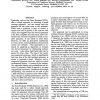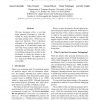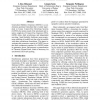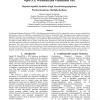89
Voted
COLING
2000
15 years 2 months ago
2000
We define state transition grammars (STG) as an intermediate tbrmalism between grammars and parsing algorithms which is intended to separate the description of a parsing strategy ...
COLING
2000
15 years 2 months ago
2000
Sharing portions of grammars across languages greatly reduces the costs of multilingual grammar engineering. Related languages share a much wider range of linguistic information t...
ACL
1998
15 years 2 months ago
1998
Treebanks, such as the Penn Treebank (PTB), offer a simple approach to obtaining a broad coverage grammar: one can simply read the grammar off the parse trees in the treebank. Whi...
104
click to vote
ACL
2000
15 years 2 months ago
2000
We present a new approach to stochastic modeling of constraintbased grammars that is based on loglinear models and uses EM for estimation from unannotated data. The techniques are...
ACL
2003
15 years 2 months ago
2003
We have developed willex, a tool that helps grammar developers to work efficiently by using annotated corpora and recording parsing errors. Willex has two major new functions. Fi...
ACL
2006
15 years 2 months ago
2006
We present an automatic approach to tree annotation in which basic nonterminal symbols are alternately split and merged to maximize the likelihood of a training treebank. Starting...
99
Voted
ACL
2006
15 years 2 months ago
2006
This work provides the essential foundations for modular construction of (typed) unification grammars for natural languages. Much of the information in such grammars is encoded in...
97
Voted
ACL
2004
15 years 2 months ago
2004
Generalized Multitext Grammar (GMTG) is a synchronous grammar formalism that is weakly equivalent to Linear Context-Free Rewriting Systems (LCFRS), but retains much of the notatio...
116
click to vote
LREC
2008
15 years 2 months ago
2008
Combinatorial Category Grammar is (CCG) a lexicalized grammar formalism which is expressed by syntactic category, a logical form representation. There are difficulties in represen...
LREC
2010
15 years 2 months ago
2010
Grammars play an important role in many Natural Language Processing (NLP) applications. The traditional approach to creating grammars manually, besides being labor-intensive, has ...




